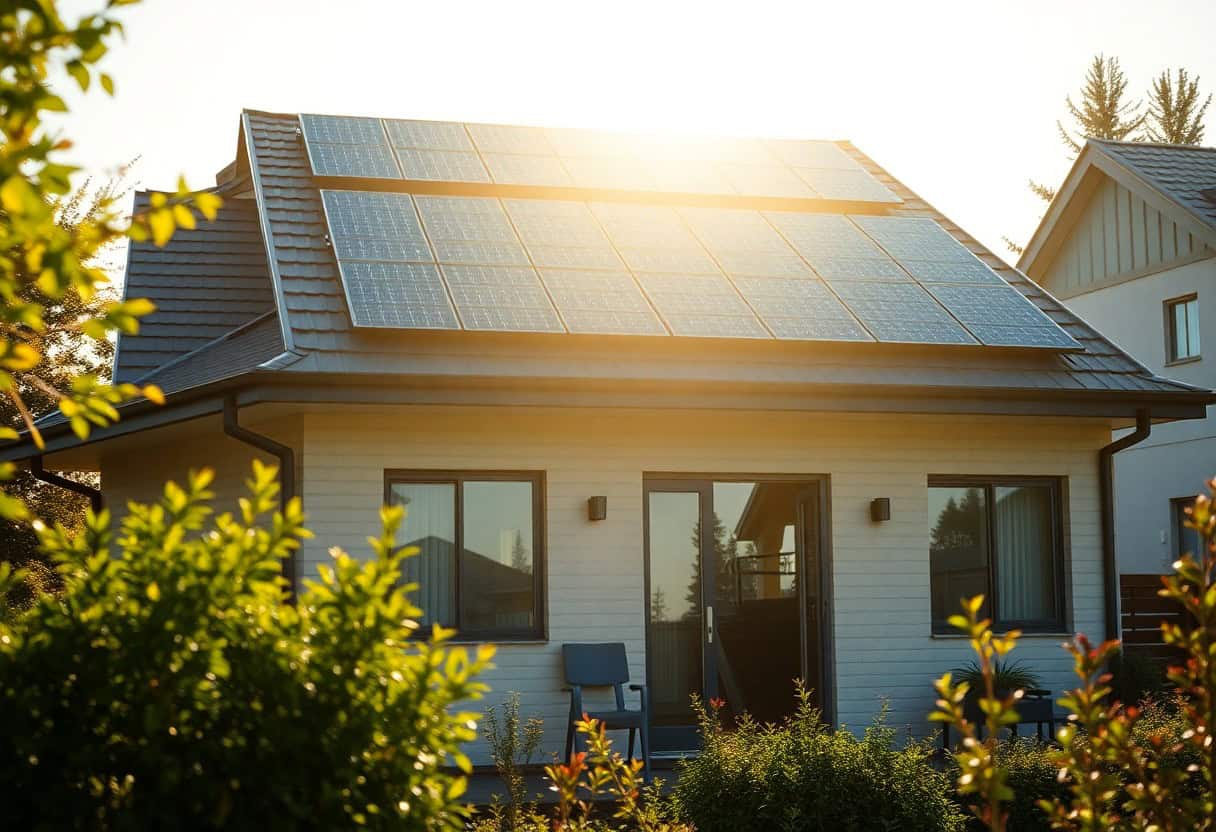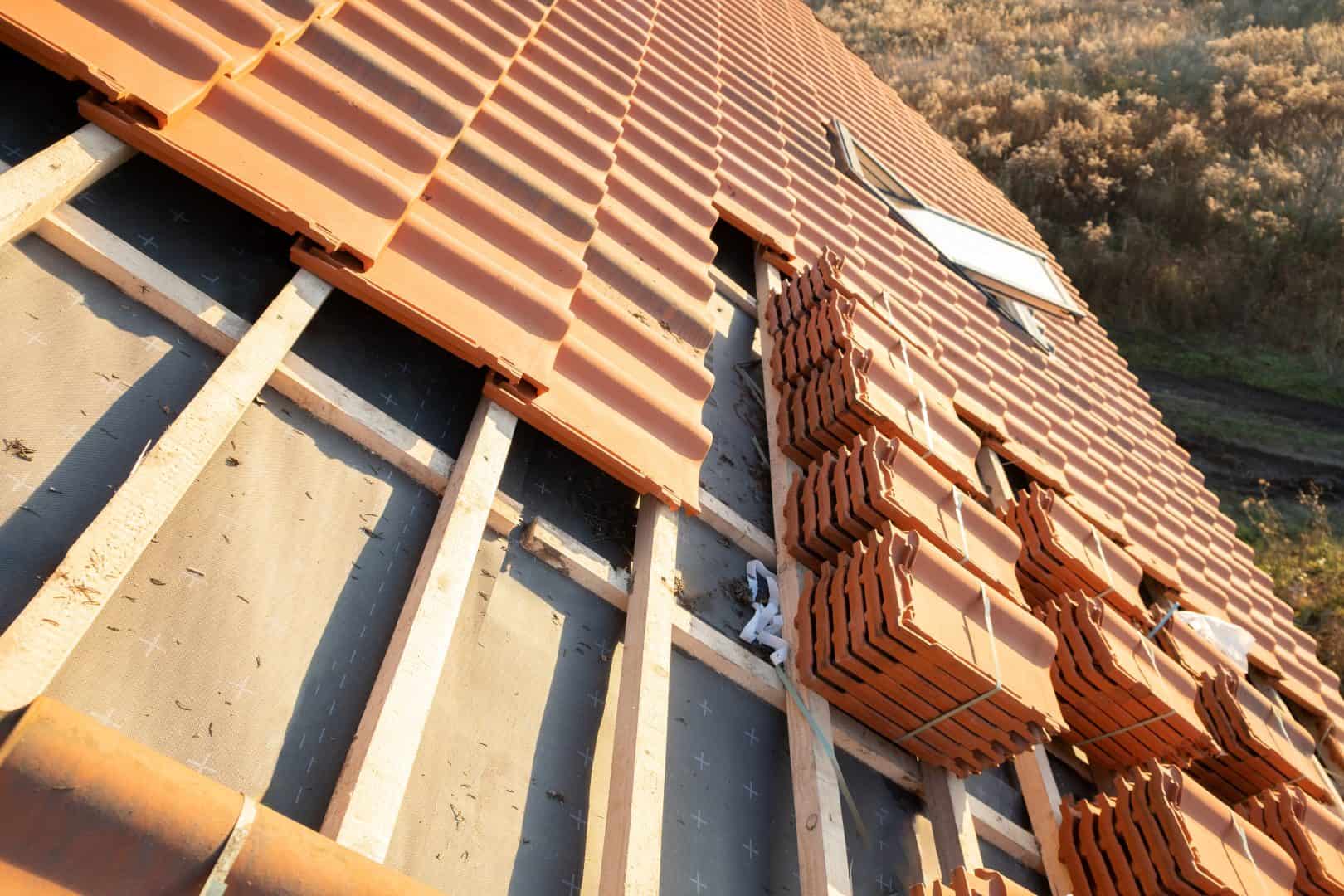Can I install solar panels on my new roof?
Fill Out The Form And We'll Get Back To You

There’s a growing interest in solar energy, and if you’ve just had a new roof installed, you might be wondering if it’s possible to add solar panels. Installing solar panels can be an excellent way to improve your home’s energy efficiency and reduce your electricity bills. In this post, we’ll explore the considerations you should take into account when deciding whether to install solar panels on your new roof, ensuring you have all the information you need to make the right choice for your home.
Key Takeaways:
- Roof Compatibility: Ensure your roof is suitable for solar panel installation, considering factors like age, material, and structural integrity.
- Orientation and Angle: The direction and pitch of your roof can significantly affect the efficiency of solar panels; ideally, they should face south at a specific angle.
- Installation Timing: It’s advisable to install solar panels at the same time as the new roof, as this can simplify the process and reduce potential damage to the roof’s integrity.
Assessing Your Roof’s Suitability
Your roof plays a vital role in determining whether you can successfully install solar panels. Key factors include the size, pitch, and orientation of your roof, as well as its overall condition. Conducting a thorough assessment will ensure you understand if your current roof meets the requirements for solar panel installation, enabling you to optimise energy generation and long-term benefits.
Roof Material Considerations
By understanding the material of your roof, you can better assess its compatibility with solar panels. Different materials, such as asphalt shingles, metal, or tiles, have varying durability and weight-bearing capacities, which can affect installation methods and the types of solar panels suitable for your roof.
Age and Condition of the Roof
Besides considering your roof’s age, evaluate its condition before moving forward with solar panel installation. An older or damaged roof may require repairs or replacement to support the weight and structure of solar panels, ensuring you do not face issues down the line.
Roof age is an imperative factor in deciding whether to install solar panels. If your roof is nearing the end of its lifespan, it might be more prudent to replace it before proceeding with solar installation. A new roof provides a solid foundation for solar panels, optimising performance and helping to avoid potential complications related to leaks or structural issues in the future.
Local Regulations and Permits
While planning to install solar panels on your new roof, it is imperative to check your local regulations and acquire any necessary permits. Different regions have varying guidelines regarding the installation of solar energy systems. To ensure compliance and avoid potential issues, you may want to read more about Replacing Your Roof? Solar Panels Should Be Included.
Building Codes
Against common assumptions, local building codes can significantly impact your solar panel installation. These codes may specify requirements for structural integrity, safety standards, and energy efficiency that your new roof and solar system must meet. Be sure to consult your local authority or a professional to guarantee compliance.
HOA Guidelines
Beside building codes, if you live within a homeowners’ association (HOA) jurisdiction, you’ll need to adhere to their specific guidelines regarding solar panel installations. These regulations may dictate the aesthetics, placement, and types of solar panels you can use, so understanding your HOA’s rules is important.
Codes can vary widely between different HOAs, so check their documentation or consult with the board members to gain clarity. Some associations may have strict architectural guidelines, while others may be more lenient. Ensuring your installation aligns with these guidelines can help avoid disputes and facilitate a smoother installation process.
Types of Solar Panels
Now, when considering solar panels for your new roof, it’s imperative to understand the different types available:
| Type | Advantages |
|---|---|
| Monocrystalline | Higher efficiency and longevity |
| Polycrystalline | More affordable but slightly less efficient |
| Thin-Film | Lightweight and flexible |
| Bifacial | Generates energy from both sides |
| Building-Integrated | Combines roofing materials with solar technology |
Assume that you are looking to optimise your investment, then the choice between these types is vital. If so, you can read more about your preparation strategy in detail in this article: I’m planning on redoing my roof soon, with the eventual ….
Monocrystalline vs. Polycrystalline
Beside the general distinctions, you may find monocrystalline panels are often viewed as the premium option due to their higher efficiency rates and longer lifespan. In contrast, polycrystalline panels tend to be more cost-effective, making them a suitable choice if budget constraints are an issue for you.
Thin-Film Solar Panels
One of the unique options is thin-film solar panels, which are made from layers of photovoltaic material. They are known for their lightweight nature and flexible design, allowing them to be installed on a variety of surfaces, including unconventional roofs.
Also, thin-film panels have a lower efficiency rate compared to crystalline types but can excel in situations where space is limited. They perform well in low-light conditions, which can be beneficial in some climates. If your roof structure allows for it, they can be an excellent choice for harnessing solar energy efficiently.
Installation Process
After deciding to go solar, the installation process begins with a thorough assessment of your new roof. This step is important to ensure its structural integrity can support solar panels. If you’re unsure whether your roof is suitable, consult this guide on Do I Need to Replace My Roof Before Going Solar? to get expert advice.
Finding a Qualified Installer
Across the UK, finding a qualified installer is key to a successful solar panel installation. Look for certified professionals with experience in your type of roofing system. Reviews and recommendations from previous customers can also guide your choice, ensuring that you select someone trustworthy and knowledgeable.
Timeline for Installation
For most projects, the timeline for installation from initial consultation to completion typically ranges from a few weeks to a few months, depending on various factors such as weather and permitting processes.
Also, the installation itself generally takes one to three days, depending on the complexity of your system. It’s important to factor in time for inspections and any necessary adjustments before you begin enjoying the benefits of solar energy.
Financial Considerations
All financial aspects of installing solar panels on your new roof warrant careful thought. You should evaluate not only the initial outlay but also the long-term savings on your energy bills. Additionally, consider the potential increase in your property’s value, as homes with solar installations can attract more buyers and sell for higher prices.
Costs of Solar Panel Installation
On average, the cost of solar panel installation varies depending on several factors, including the size of the system, materials used, and your location. It’s important to obtain multiple quotes from reputable contractors to ensure you get a competitive price. While the upfront investment can be significant, it’s important to assess financing options that may alleviate the burden.
Incentives and Rebates
Incentives for solar panel installation can significantly lower your overall costs. Various government schemes and local programmes offer tax credits, rebates, or financing options that make solar energy more affordable for homeowners. Being aware of these initiatives can help you maximise your savings.
Considerations surrounding incentives and rebates vary by region and can greatly impact your decision to install solar panels. You should research available offerings in your area, such as Feed-in Tariffs or Renewable Heat Incentives, which can provide substantial financial benefits. Additionally, some local authorities may offer grants or low-interest loans to assist with installation costs; therefore, staying informed on these opportunities is key to enhancing your project’s financial viability.
Maintenance and Longevity
Despite the initial investment, your solar panels can provide significant long-term benefits with proper maintenance. Regular upkeep ensures that they function optimally, enhancing their longevity and efficiency. By committing to a maintenance schedule, you can safeguard your investment and enjoy the financial and environmental rewards that solar energy can offer for decades.
Cleaning and Inspection
To maintain the efficiency of your solar panels, regular cleaning and inspection are necessary. Dust, leaves, and debris can accumulate, obstructing sunlight and reducing energy output. You should aim to clean your panels a few times a year, depending on your environment, and conduct inspections to identify any potential issues before they escalate.
Warranty Considerations
Inspection of your solar panel system is important for warranty considerations. Your warranty may require evidence of routine maintenance and inspections to remain valid. Failure to adhere to these stipulations could result in the forfeiture of your warranty coverage, leaving you financially liable for repairs.
For instance, many manufacturers stipulate that you must have your solar panels serviced annually by a professional certified technician to keep your warranty intact. In addition, some warranties may cover specific types of damage but could be voided if the damage is attributed to a lack of maintenance. Therefore, understanding the terms of your warranty and ensuring compliance is integral to safeguarding your investment over time.
Conclusion
Now that you have explored the possibility of installing solar panels on your new roof, it is important to consider factors such as the type of roof, its orientation, and structural integrity. If your roof is suitable and meets local regulations, you can enjoy the numerous benefits of solar energy. Consulting with a professional can provide you with tailored advice, ensuring your investment aligns with both your energy needs and financial goals.
FAQ
Q: Can I install solar panels on my new roof?
A: Yes, it is possible to install solar panels on your new roof, provided that the structure is suitable and meets certain conditions. Before installation, it is advisable to consult with a professional to ensure that your roof can support the weight of the solar panels and that there are no obstructions such as chimneys or skylights that may affect the installation process.
Q: Will installing solar panels on a new roof void the warranty?
A: Generally, installing solar panels should not void the warranty on your new roof, as long as the installation is carried out by a qualified professional who adheres to the manufacturer’s guidelines. However, it is wise to review the warranty terms closely and discuss potential installations with your roofing contractor to avoid any unintended consequences.
Q: What additional considerations should I have when installing solar panels on a new roof?
A: When installing solar panels on a new roof, you should consider the roof’s orientation and tilt to maximise solar exposure. Additionally, it’s advisable to review local regulations and potential planning permissions required for solar panel installation. Consulting with both your roofing and solar installation professionals can help ensure a successful integration of the two systems.
Re-Roof of Bungalow
The guys made a fantastic job of replacing the roof on our bunglaow. They were fasy, relaible and excellent value for money.
Chimney Removal
We employed Wrights Roofs to take down our very old chimney – tht had seen better days. They carefully removed and made good the area where the chimney was. Really impressed.
New Roof
We had an extension built and Wrights came and put a new roof on. They were brilliant, no fuss, great value for money. Thank you.
Roofs, Flat Roofs Chimneys and Solar Panels
If you need roof work on your home, please complete the form or call us today.

